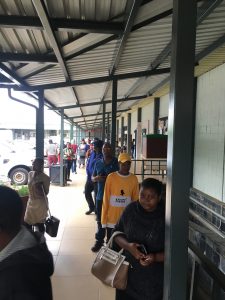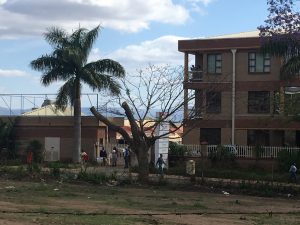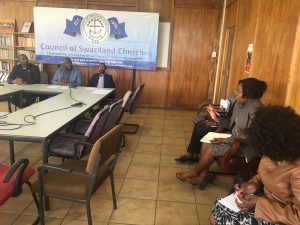An Update regarding Human Rights in Eswatini
Kahala Cannon served as a Mission Co-worker with the Council of Swaziland Churches (eSwatini) for three years (April 2019- January 2022) and currently serves as the Acting Africa Area Executive for Global Ministries

“Things are getting bad here…death rate of high-profile people is alarming…The company bosses are dying like flies.” Ms. D. Dlamini
“In this country, people are now dying in numbers due to Corona! We are losing close family and relatives!” Mr. K. Dlamini
“I am doing well. The situation is not good, and people are dying. Mortuaries are full. To manage the situation, people are buried within three days after death. Every day is a burial day now versus the known weekends …” Mr. E. Nkambule
Testimonies regarding the devastating effects of the coronavirus in the Kingdom of Eswatini are incredibly difficult to digest. Eswatini is particularly vulnerable to a widescale impact of the pandemic due to its relatively small size (land area) and economy. The rapid increase in the number of new COVID-19 cases and related deaths during this second wave has caused a severe strain on the country’s healthcare system, economy, and local communities. This pandemic threatens the sustainability of the nation.

The right to health, specifically the availability and accessibility of prescription drugs, has been seriously challenged during this pandemic. Additionally, and of equal importance, are the rights to be treated with dignity and respect, of privacy, and to travel around the country without being subjected to undue violence. Various circumstances have caused public confidence in the Eswatini government’s ability or willingness to protect all citizens’ rights to wane.
In April of 2020, the Eswatini government implemented travel restrictions to minimize the spread of disease during the first wave of the virus. In a written statement, the government announced that “people traveling between cities, towns, and regions will need written permission from local authorities…” Work-related travel would require a letter from one’s employer. The Prime Minister deployed security forces throughout the region to enforce these restrictions. However, the enforcement of these stark measures soon led to allegations of human rights violations.

Movement of the general population was restricted to conducting essential business, which included medical care at a hospital or clinical facility, and pharmacy and grocery store visits. Many citizens reported that police officers routinely invaded their privacy by demanding evidence that a hospital visit was warranted. Therefore, patients would be forced to disclose their personal medical history or the purpose of their visit to the hospital. This was a particularly painful experience for those who were picking up antiretroviral therapy (ART) medication. Following many complaints of human rights violations, the government prohibited the practice of requiring patients to disclose their personal information to officers.
In the anonymity of a private online chat group for United States citizens in Eswatini, a member reported that a colleague was turned away and prohibited from traveling to attend to essential business despite possessing the required certification and authorization letter. Allegations of human rights violations during the first wave of the virus continued to surface.

Two non-governmental organizations (NGOs) formed a task force to investigate these reports of human rights violations. The Council of Swaziland Churches (CSC) collaborated with the Coordinating Assembly of Non-Governmental Organizations (CANGO) to monitor the practices of law enforcement and soldiers and address complaints relayed by EmaSwati, foreign nationals, and visitors.
People affected by the brutality were outraged and began to share their stories. Many informants, fearing reprisal, gave their statements covertly. As reports of human rights abuse flooded in, the CSC-CANGO team dispatched volunteers to the country’s various “hot spots” for violations. Volunteers acquired information and details to receive actionable feedback from the team. The CSC-CANGO team also immediately addressed any reports of human rights abuses covered by news outlets.
Consequently, reports of police officer brutality during lockdown enforcement declined, and the NGO collaboration dissolved. While the project and nationwide surveillance has now come to an end, the fight for human rights has not. Allegations of police abuse continue. Members of the former team are committed to taking legal action against the government for multiple violations. Therefore, the fight continues!

“All our efforts will be in vain if we do not individually, collectively, and with a common purpose, consistently play our role in conquering this intimidating Goliath.” — Acting Prime Minister, Mr. Themba Nhlanganiso Masuku
When coronavirus rates began to decline in the first wave, the government began to relax lockdown standards. Thus, the country had mostly resumed pre-COVID operations when the second wave hit—a wave characterized by a high rate of fatalities, including many prominent citizens. On December 13, 2020, Eswatini Prime Minister H.E. Ambrose Mandvulo Dlamini passed away, becoming the first world leader to die due to complications from the virus. The country also lost two cabinet ministers and two prominent Church leaders. Additionally, the Council of Swaziland Churches lost two members who served on the Council of Elders (CSC).
March 2022 Update
As of March 2022, the fight for Democracy and the release of pro-Democracy Members of Parliament (MPs), Mduduzi Bacede Mabuza and Mthandeni Dube, who were arrested and denied bail for supporting the movement for change in the Kingdom of Eswatini continues.
The High Court is accused of unjustly imprisoning the Members of Parliament (MPs) on alleged unfounded charges of terrorism, including inciting the public to commit violence (i.e. encouraging people to vandalize and burn buildings) and governmental revolt. EmaSwati attest that the accusations against the pro-Democracy supporters are false and there is no evidence to support these claims. They acknowledge and respect the office of the king; however, want a Prime Minister who is elected by the people, and work for the people, as opposed to being appointed by the king.
The High Court initially denied the MPs’ application for bail. As the they appealed the Courts’ decision, their Criminal Trial date was set for February 2022, before their appeal was heard. Following their successful appeal, and the MPs supporters’ tireless fight for justice, their bail hearing was finally set for April 2022. Subsequently, their hearing was moved from April 2022 to March 26, 2022, due to continued protests for due process in the quest for an expeditious resolution.
In the wake of their impending bail hearing, the Criminal Trial for the MPs started at the High Court on February 22, 2022. Protests ensured countrywide and on the grounds of the High Court. MPs supporters were camped outside the Court, lifting their voices in song and protest. On Thursday, February 24, 2022, supporters were met with violence by law enforcement outside the Hight Court. Witnesses reported that officers fired rubber bullets and tear gas at MPs supporters who were gathered outside the courthouse. At least three people were reportedly injured in the incident.
MPs Mabuza and Dube’s Criminal Trial is currently ongoing, and they remain in prison, without bail. However, if their Criminal Trial is still in progress on March 26th, their bail hearing will still take place. If granted bail, the MPs will be released from prison to attend their Criminal Trial, while out on bail. The Council of Swaziland Churches (CSC) continues to monitor the situation closely in an effort to ensure that the fight for justice is carried out justly.
Kahala Cannon served with the Council of Swaziland Churches (eSwatini). Her appointment was made possible by your gifts to Disciples Mission Fund, Our Church’s Wider Mission, and your special gifts.

